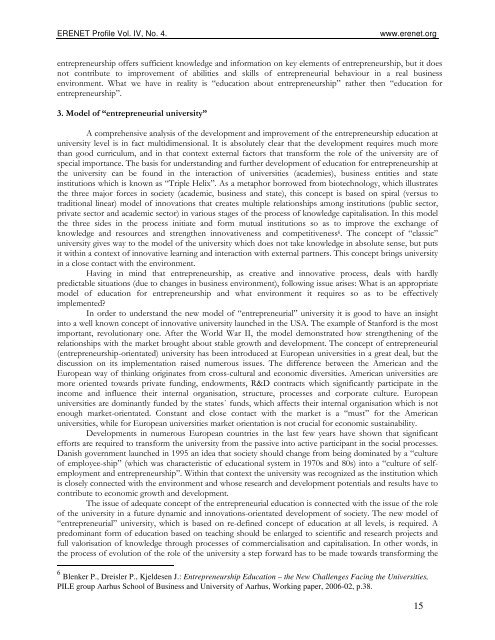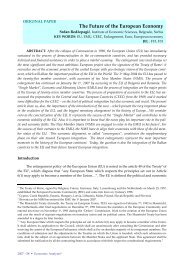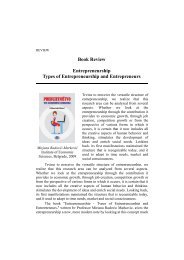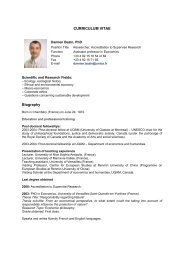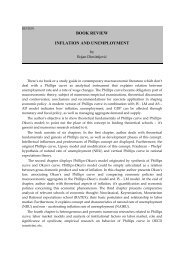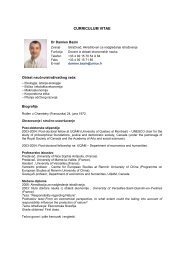Issue 16
Issue 16
Issue 16
You also want an ePaper? Increase the reach of your titles
YUMPU automatically turns print PDFs into web optimized ePapers that Google loves.
ERENET Profile Vol. IV, No. 4.<br />
www.erenet.org<br />
entrepreneurship offers sufficient knowledge and information on key elements of entrepreneurship, but it does<br />
not contribute to improvement of abilities and skills of entrepreneurial behaviour in a real business<br />
environment. What we have in reality is “education about entrepreneurship” rather then “education for<br />
entrepreneurship”.<br />
3. Model of “entrepreneurial university”<br />
A comprehensive analysis of the development and improvement of the entrepreneurship education at<br />
university level is in fact multidimensional. It is absolutely clear that the development requires much more<br />
than good curriculum, and in that context external factors that transform the role of the university are of<br />
special importance. The basis for understanding and further development of education for entrepreneurship at<br />
the university can be found in the interaction of universities (academies), business entities and state<br />
institutions which is known as “Triple Helix”. As a metaphor borrowed from biotechnology, which illustrates<br />
the three major forces in society (academic, business and state), this concept is based on spiral (versus to<br />
traditional linear) model of innovations that creates multiple relationships among institutions (public sector,<br />
private sector and academic sector) in various stages of the process of knowledge capitalisation. In this model<br />
the three sides in the process initiate and form mutual institutions so as to improve the exchange of<br />
knowledge and resources and strengthen innovativeness and competitiveness 6 . The concept of “classic”<br />
university gives way to the model of the university which does not take knowledge in absolute sense, but puts<br />
it within a context of innovative learning and interaction with external partners. This concept brings university<br />
in a close contact with the environment.<br />
Having in mind that entrepreneurship, as creative and innovative process, deals with hardly<br />
predictable situations (due to changes in business environment), following issue arises: What is an appropriate<br />
model of education for entrepreneurship and what environment it requires so as to be effectively<br />
implemented?<br />
In order to understand the new model of “entrepreneurial” university it is good to have an insight<br />
into a well known concept of innovative university launched in the USA. The example of Stanford is the most<br />
important, revolutionary one. After the World War II, the model demonstrated how strengthening of the<br />
relationships with the market brought about stable growth and development. The concept of entrepreneurial<br />
(entrepreneurship-orientated) university has been introduced at European universities in a great deal, but the<br />
discussion on its implementation raised numerous issues. The difference between the American and the<br />
European way of thinking originates from cross-cultural and economic diversities. American universities are<br />
more oriented towards private funding, endowments, R&D contracts which significantly participate in the<br />
income and influence their internal organisation, structure, processes and corporate culture. European<br />
universities are dominantly funded by the states` funds, which affects their internal organisation which is not<br />
enough market-orientated. Constant and close contact with the market is a “must” for the American<br />
universities, while for European universities market orientation is not crucial for economic sustainability.<br />
Developments in numerous European countries in the last few years have shown that significant<br />
efforts are required to transform the university from the passive into active participant in the social processes.<br />
Danish government launched in 1995 an idea that society should change from being dominated by a “culture<br />
of employee-ship” (which was characteristic of educational system in 1970s and 80s) into a “culture of selfemployment<br />
and entrepreneurship”. Within that context the university was recognized as the institution which<br />
is closely connected with the environment and whose research and development potentials and results have to<br />
contribute to economic growth and development.<br />
The issue of adequate concept of the entrepreneurial education is connected with the issue of the role<br />
of the university in a future dynamic and innovations-orientated development of society. The new model of<br />
“entrepreneurial” university, which is based on re-defined concept of education at all levels, is required. A<br />
predominant form of education based on teaching should be enlarged to scientific and research projects and<br />
full valorisation of knowledge through processes of commercialisation and capitalisation. In other words, in<br />
the process of evolution of the role of the university a step forward has to be made towards transforming the<br />
6 Blenker P., Dreisler P., Kjeldesen J.: Entrepreneurship Education – the New Challenges Facing the Universities,<br />
PILE group Aarhus School of Business and University of Aarhus, Working paper, 2006-02, p.38.<br />
15


